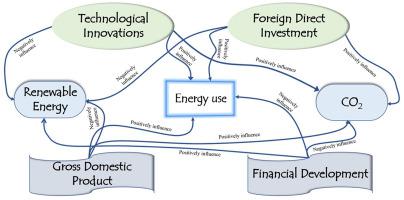Renewable Energy ( IF 8.7 ) Pub Date : 2021-02-23 , DOI: 10.1016/j.renene.2021.02.075 Anwar Khan , Yang Chenggang , Jamal Hussain , Zhou Kui

|
This study aims to estimate the short-term and long-term impacts of technological innovation, finance, and foreign direct investment on renewable energy, non-renewable energy, and CO2 emissions in 69 countries of the “Belt and Road Initiative (BRI)" from 2000 to 2014. Using robust standard error regression and dynamic GMM estimators, the results showed that technological innovations, economic growth, and foreign direct investment (FDI) have a negative impact on renewable energy. In contrast, financial developments have shown to be a significant positive determinant of the study area’s renewable energy sector. The impression of technological innovation, FDI, and economic growth is positive, contributing to energy use and CO2 emissions in the BRI countries. The Granger non-causality test showed two-way causal links between renewable energy, technological innovation, finance, and FDI. The study’s practical applications are unique and have policy implications; for example, financial markets in the BRI countries should be promoted because they are the main determinants of the renewable energy sector and economic growth, reducing CO2 emissions. Furthermore, investment in the R&D of technological innovations is much needed in these countries.
中文翻译:

一带一路倡议国家技术创新,金融发展和外国直接投资对可再生能源,不可再生能源和环境的影响
这项研究旨在评估“一带一路”倡议(BRI)中69个国家的技术创新,金融和外国直接投资对可再生能源,不可再生能源和CO 2排放的短期和长期影响。“从2000年到2014年。使用健壮的标准误差回归和动态GMM估算器,结果表明技术创新,经济增长和外国直接投资(FDI)对可再生能源产生了负面影响。相比之下,金融发展已显示出研究区域可再生能源部门的重要积极决定因素,技术创新,外国直接投资和经济增长给人的印象是积极的,有助于能源使用和二氧化碳2``一带一路''沿线国家的排放量。格兰杰非因果关系检验显示了可再生能源,技术创新,金融和外国直接投资之间的双向因果联系。该研究的实际应用是独特的,具有政策意义。例如,应促进“一带一路”沿线国家的金融市场,因为它们是可再生能源部门和经济增长的主要决定因素,可以减少CO 2排放。此外,这些国家急需对技术创新的研发进行投资。



























 京公网安备 11010802027423号
京公网安备 11010802027423号